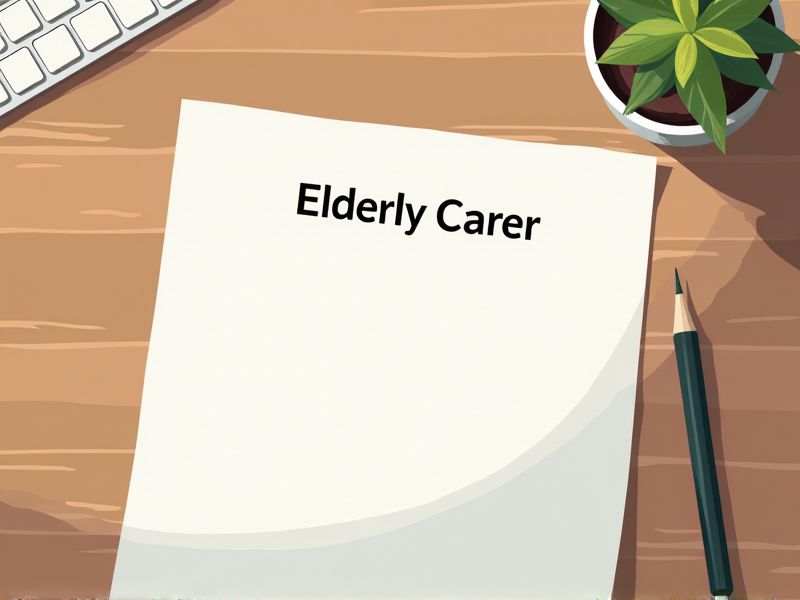
Elderly Carers interact with a vulnerable demographic requiring specialized knowledge to ensure their well-being and safety. Certifications validate a carer's skills in areas such as first aid, medication management, and dementia care, enhancing trust from families and healthcare providers. Regulatory bodies and employers often mandate specific credentials to maintain standardization and quality of care. Here are some important certifications you might need to become an Elderly Carer.
Certified Nursing Assistant (CNA) Certification
Obtaining a Certified Nursing Assistant (CNA) certification ensures that an elderly carer possesses the necessary medical knowledge and skills to provide quality care. Certification provides a standardized level of competency which can lead to improved patient safety and care quality. CNA certification often enables carers to perform more medical tasks, such as taking vital signs, under the supervision of a healthcare professional. Regulatory agencies and healthcare facilities require certification to ensure adherence to healthcare industry standards and legal requirements, thus maintaining trust and accountability.
CPR and AED Certification
CPR and AED certification equips elderly carers with the skills to respond effectively in the event of cardiac emergencies, which are more prevalent among the elderly population. Knowing how to perform CPR can increase the chances of survival for older adults experiencing cardiac arrest. AED training ensures carers can correctly use automated external defibrillators, which can restore a normal heart rhythm before emergency medical services arrive. Certification demonstrates a carer's commitment to safety and competence, potentially increasing trust among families and agencies seeking care for their elderly loved ones.
First Aid Certification
First Aid Certification equips elderly carers with the essential skills to handle medical emergencies, which can directly impact the well-being and safety of elderly individuals. Having certified knowledge reduces the risk of complications from accidents or sudden health issues, ensuring timely and appropriate care. Certification also enhances trust among families and care organizations, ensuring a professional standard in the caregiving process. Proper training in first aid can significantly increase the survival rate and recovery prospects for elderly individuals in critical situations.
Basic Life Support (BLS) Certification
Basic Life Support (BLS) certification equips elderly carers with the essential skills to handle medical emergencies like cardiac arrest, which are more common in the elderly. Carers trained in BLS can provide immediate CPR, increasing a senior's chances of survival while waiting for professional medical help. BLS certification ensures carers can recognize the signs of choking, stroke, or heart attack, leading to quicker intervention. Having BLS-certified staff reassures families that loved ones receive high-standard care, promoting trust in caregiving services.
Dementia Care Certification
Dementia care certification equips carers with specialized knowledge, leading to enhanced quality of care for individuals with dementia. Due to increasing dementia prevalence, trained carers are essential in addressing the unique needs of this growing population. Proper certification helps ensure adherence to best practices, reducing the risk of mismanagement or harm. Public trust in caregiving services often increases when carers have certified expertise in dementia care.
Medication Administration Certification
Medication Administration Certification is essential for elderly carers because it ensures they have the necessary skills to safely manage and dispense medication, reducing the risk of dosage errors. Certified carers are better prepared to recognize and respond to adverse reactions, enhancing patient safety. The certification provides a standardized understanding of medication interactions, which is crucial given the complex medication regimens often required by the elderly. It also instills confidence in families and healthcare providers that the carer is competent in handling medication-related responsibilities.
Safe Patient Handling Certification
Safe Patient Handling Certification equips elderly carers with skills to prevent patient injuries during transfers and lifts. It reduces the risk of musculoskeletal injuries among carers, promoting their long-term health. Certification ensures compliance with healthcare standards, which enhances care quality and patient trust. It also enables carers to efficiently use specialized equipment, improving operational effectiveness in caregiving environments.
Palliative Care Certification
A palliative care certification equips elderly carers with essential skills to effectively manage symptoms and provide comfort for patients with serious illnesses. It ensures carers are knowledgeable about advanced care planning, enabling better decision-making tailored to individual patient needs. This certification increases the carers' credibility and confidence, leading to improved trust and rapport with families. Such training emphasizes ethical considerations and communication skills, crucial when dealing with patients in life-limiting conditions.
Hospice Care Certification
Hospice care certification ensures that elderly carers possess the specialized skills necessary to provide compassionate and appropriate care for individuals nearing the end of life. With this certification, carers are better equipped to manage pain, address emotional needs, and recognize the complex conditions associated with terminal illnesses. Certification also indicates a standard of quality and professionalism, reassuring families that their loved ones are in competent hands. The aging population is increasing, leading to a higher demand for trained hospice professionals who can offer meaningful support during life's final stages.
Geriatric Care Management Certification
Geriatric Care Management Certification enhances an elderly carer's skills, ensuring specialized knowledge in managing age-related health conditions. With certification, carers can provide personalized care plans that improve the quality of life for seniors. The certification equips carers with updated information on best practices, which is crucial in responding to the complex needs of elderly clients. Having certified carers increases trust and reassurance for families seeking reliable care for their aging loved ones.
Summary
When you earn certifications as an Elderly Carer, you enhance your credibility and trustworthiness in the eyes of employers and clients. This recognition often opens up opportunities for better job positions and potentially higher pay, as you are seen as more skilled and knowledgeable. With formal training, you can provide improved care and service, leading to higher client satisfaction and well-being. Your advanced skills may also enable you to manage challenging situations efficiently, reducing stress and errors in care delivery.
